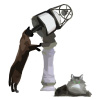
The Astrophysics Spectator
Several academics are now under fire for their words. Lawrence Summers, the president of Harvard University, is under fire for suggesting that biology might partly explain why there are fewer women than men in tenured positions in physics and other hard sciences. Ward Churchill, a professor of ethnic studies at the University of Colorado, found himself in trouble for remarks he made after the terrorist attacks of 9/11/01, where he called those killed in the attacks on the World Trade Center “little Eichmanns” and suggested they deserved to die for being part of a corrupt American system. Professor Hans Hoppe, an economics professor at the University of Nevada, Los Vegas, is under investigation for citing homosexuals as one of several examples of groups that plan less than others for the future during a class on money and banking; a student claimed to be offended by the professors remarks.
Each of these gentlemen have been defended with the claim of “academic freedom.” Such a use of academic freedom, however, is too expansive. To my mind, the concept of academic freedom is very narrow and restrictive, and implies both a privilege and a duty. While I believe Lawrence Summers comments fall within the bounds of academic freedom, the comments of the other professors bring in other issues, such as free speech versus the right of a university to protect its image, or the obligations of a university to properly educate its students.
Academic freedom is the privilege of a researcher to study unsettled issues within his profession. This is a narrower concept than freedom of though and freedom of speech. It is narrow, because many issues within any academic field are now settled, and the questioning of our understanding of these issues, especially assertions that our understanding is totally incorrect, is at best a waste of time and at worst destructive of the profession. Academic freedom can only apply to issues that are unsettled because of shortcoming in the observations, experiments, or theories.
As an example of a closed issue, I can point to our theory for the origin of the energy released by a star. Without any doubt, most of the energy released by a star is produced through nuclear fusion of light elements such as hydrogen into heavier elements. The theory of stellar evolution with nuclear fusion provides accurate models of stellar observations. If someone in the profession were to question this theory and to propose alternative theories for the energy source, he would rightly be regarded as either ignorant or crazy. The only issues up for debate concern the details of the physics occurring within a star.
This settle nature of much of science raises the difficult question of when to declare a topic settled, and therefore outside the bounds of further study. One can easily imagine a society of scientists declaring a problem solved that is in fact still unresolved. An early example of this is the acceptance of the Ptolemaic solar system, which has the planets orbiting the Earth; the inability by many astronomers to consider ideas other than those of Ptolemy slowed the acceptance of Copernicus's planetary theory.
This concern over closing a topic to further enquiry too soon suggests that academic freedom should be applied loosely. While I might believe an issue is settled, I may be mistaken in the interpretation of some of the data, or I may place more weight on a piece of data than is warranted. Either way, to promote progress within the profession, I must be careful of where the line between settled and unsettled science is drawn.
Where this line is drawn in practice between unsettled and settled science is very subjective. In astrophysics, one finds a broad range of criteria used to judge funding proposal and to referee scientific papers; it is through these two processes that limits are placed on scientific enquiry. I have seen papers rejected for the most trivial of reasons, and I have seen papers of the most speculative sort accepted. At the most liberal limits of academic freedom, one finds research papers on the early universe that are so speculative in their physics that they are better though of as science fiction than as solid science. On balance, it is best to error on the side of accepting papers and research proposals that are speculative or out of the mainstream than risk destroying research and debate in issues that are as yet unsettled.
One final point to make is that academic freedom is quite different, and much narrower than free speech. Under free speech, not only can I propose alternative theories to settled scientific topics, I can propose theories that I know to be wrong, and I can deny the validity of theories that I know to be correct. I can say these things, but I should have no expectation that anyone within the sciences will listen to me or even bother to respond. I can exercise my right of free speech, but if I do so in a way that violates the spirit of academic freedom, I will no longer be part of the scientific community.
Jim Brainerd
